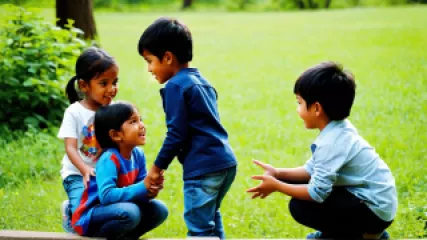Understanding Child Behavior: Key Research Findings
Child behavior can be complex and varied, influenced by a multitude of factors such as genetics, environment, and social interactions. Understanding child behavior is crucial for parents, educators, and mental health professionals to provide appropriate support and intervention when needed. In this research summary, we will explore key findings from studies that shed light on various aspects of child behavior.
1. The Role of Genetics
Genetics plays a significant role in shaping child behavior. Research has shown that certain traits and behaviors have a strong genetic component. For example, studies have indicated that attention-deficit/hyperactivity disorder (ADHD) has a heritability estimate of around 70-80%. This means that genetic factors contribute significantly to the development of ADHD.
Furthermore, twin studies have provided valuable insights into the genetic influence on behavior. Identical twins, who share 100% of their genes, are more likely to exhibit similar behavior compared to fraternal twins, who share only 50% of their genes. These findings suggest that genes contribute to behavioral similarities among individuals.
2. Environmental Factors
While genetics play a role, it is important to acknowledge the impact of environmental factors on child behavior. The environment in which a child grows up can shape their behavior and development. Research has shown that exposure to adverse childhood experiences, such as abuse, neglect, or household dysfunction, can have long-lasting effects on behavior.
Additionally, parenting styles and practices significantly influence child behavior. Studies have identified different parenting styles, including authoritative, authoritarian, permissive, and neglectful. An authoritative parenting style, characterized by warmth, support, and reasonable discipline, has been associated with positive child outcomes, including better emotional regulation and social skills.
3. Socioeconomic Status
Socioeconomic status (SES) is another important factor that can impact child behavior. Research has consistently shown a link between lower SES and higher rates of behavioral problems in children. Children from disadvantaged backgrounds may face various challenges, such as limited access to resources, exposure to stressors, and fewer opportunities for enrichment activities.
Studies have indicated that low SES is associated with increased risk of externalizing behaviors, such as aggression and conduct problems. It is crucial to consider the socioeconomic context when assessing and addressing child behavior difficulties, as interventions may need to target both individual and environmental factors.
4. Peer Influence
Peers play a significant role in shaping child behavior, particularly during adolescence. Research has shown that peer influence can impact various aspects of behavior, including substance use, risk-taking behaviors, and socialization patterns. Adolescents who associate with deviant peers are more likely to engage in delinquent behaviors.
Furthermore, social acceptance and rejection by peers can affect a child's self-esteem and emotional well-being. Bullying, for example, can have detrimental effects on a child's mental health and behavior. Understanding the dynamics of peer influence can help identify strategies to promote positive peer relationships and prevent negative behavioral outcomes.
5. Importance of Early Intervention
Early intervention is crucial when addressing child behavior difficulties. Research has consistently shown that early intervention programs can lead to better outcomes for children with behavioral issues. These programs often involve a combination of therapeutic interventions, parental support, and educational strategies.
Childhood anxiety is one area where early intervention is particularly important. Anxiety disorders are among the most common mental health disorders in children and can significantly impact their daily functioning. Therapy for teenagers with anxiety disorders has been shown to be effective in reducing symptoms and improving overall well-being.
6. Access to Mental Health Services for Kids
Despite the importance of early intervention, many children and adolescents do not have access to appropriate mental health services. There is a significant treatment gap when it comes to youth mental health resources. This can be attributed to various factors, including limited availability of services, financial barriers, and stigma surrounding mental health.
Addressing this treatment gap requires a multi-faceted approach, involving increased investment in mental health services, improved training for professionals, and destigmatization efforts. It is essential to prioritize the mental health needs of children and ensure they have access to timely and effective interventions.
By understanding the key research findings on child behavior, we can enhance our knowledge and promote better support for children's emotional and behavioral well-being. Genetics, environment, socioeconomic factors, peer influence, and early intervention all play crucial roles in shaping child behavior. By addressing these factors and ensuring access to mental health services for kids, we can create a nurturing environment that fosters healthy development and positive outcomes for children.






